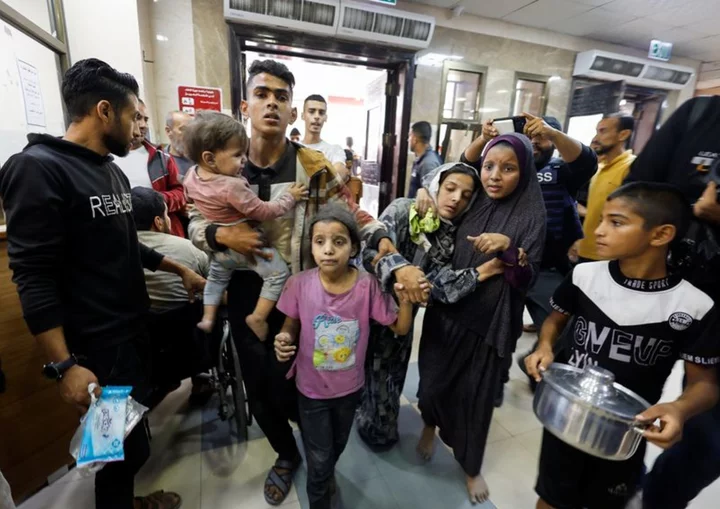By Nidal al-Mughrabi and Dan Williams
GAZA/JERUSALEM (Reuters) -Israeli forces reached the gates of Gaza City's main hospital on Monday, the primary target in their battle to seize control of the northern half of the Gaza Strip, where medics said patients including newborn babies were dying for lack of fuel.
There was also fresh concern that the war could spread beyond Gaza, with an upsurge of clashes on Israel's northern border with Lebanon, and the United States launching air strikes on Iran-linked militia targets in neighbouring Syria.
Israel launched its campaign last month to annihilate Hamas, the militant group which runs the Gaza Strip, after Hamas fighters rampaged through southern Israel killing civilians. Around 1,200 people died and 240 were dragged to Gaza as hostages according to Israel's tally, in the deadliest day in its 75-year history.
Since then thousands of Gazans have been killed and more than half of the population made homeless by a relentless Israeli military campaign. Israel has ordered the total evacuation of the northern half of Gaza. Gaza medical authorities say more than 11,000 people have been confirmed killed, around 40% of them children.
Israeli ground forces entered Gaza in late October and have quickly encircled Gaza City, the main settlement in the north. Fighting has since been concentrated in a tightening circle around the Shifa hospital, the enclave's biggest, where thousands of civilians sought shelter.
Israel says Hamas fighters have an underground headquarters in tunnels beneath the hospital and are deliberately using its patients as a shield, which Hamas denies.
Gaza health ministry spokesperson Ashraf Al-Qidra, who was inside the Al Shifa hospital in Gaza city, said an Israel tank was now stationed at the hospital gate.
"The tank is outside the gate of the outpatient clinic department, this is how the situation looks this morning," Qidra told Reuters by phone.
Israel has told civilians to leave and medics to send patients elsewhere. It says it has attempted to evacuate babies from the neo-natal ward and left 300 litres of fuel to power emergency generators at the hospital entrance, but the offers were blocked by Hamas.
Qidra, the Gaza health ministry spokesperson, denied rejecting the offers of fuel but said the 300 litres would power the hospital for just half an hour. Shifa needed 8,000-10,000 litres of fuel per day, which must be delivered by the Red Cross or an international aid agency, he told Reuters.
An Israeli official who requested anonymity said 300 litres could last several hours because only the emergency room was now operating, reducing the hospital's need for fuel.
The Gaza health ministry said that of 45 babies in incubators at Shifa, three had died as of Sunday. Qidra had no immediate update.
A surgeon at the hospital, Dr Ahmed El Mokhallalati, said on Sunday bombing had forced staff to line up premature babies on ordinary beds, using the little power available to run warm them.
"We are expecting to lose more of them day by day," he said.
Al Shifa was "not functioning as a hospital anymore", World Health Organization chief Tedros Adhanom Ghebreyesus said in a post on X.
"Tragically, the number of patient fatalities has increased significantly," he said. "The world cannot stand silent while hospitals, which should be safe havens, are transformed into scenes of death, devastation, and despair."
POLARISED WORLD
The more than month-long conflict has polarised the world, with many countries saying that even the shocking brutality of the Hamas attacks did not justify an Israeli response that has killed so many civilians in a crowded territory under siege.
Israel says it must destroy Hamas, and the blame for harm to civilians falls on fighters who intentionally hide among them. It has rejected demands for a ceasefire, which it says would only prolong the suffering by giving Hamas a chance to regroup, a position supported by Washington, which nevertheless says it is pressing its ally to protect civilians.
"The United States does not want to see firefights in hospitals where innocent people, patients receiving medical care, are caught in the crossfire and we've had active consultations with the Israeli Defence Forces on this," White House National Security Adviser Jake Sullivan told CBS News.
Hundreds of thousands of civilians are believed to remain in the northern part of Gaza where the fighting is focused, despite Israel's order to leave. Israel has also regularly bombed the south, leaving Gazans saying they have nowhere safe to go.
The order to leave the north amounted to a choice "whether to stay in your home, where your memories are and where you were born, and go to nowhere or be bombed," said Ahmed, 42, reached by phone in the Jabalia refugee camp in northern Gaza.
"Most of the people in Jabalia didn't leave and they don't want to leave. Israel doesn't differentiate between north and south," he said.
In the south, Israeli planes bombed several houses in Khan Younis. In one strike health officials said seven people were killed and several wounded.
At Nasser Hospital, people in private cars brought casualties including children to the emergency department.
"There are dead bodies under the rubble, we need ambulances," one of the men cried.
The conflict has raised fears of a broader conflagration. Lebanon-based Hezbollah, which like Hamas is backed by Iran, has traded missile attacks with Israel, and other Iran-backed groups in Iraq and Syria have launched at least 40 separate drone and rocket attacks on U.S. forces.
The United States carried out two air strikes in Syria against Iran-aligned groups on Sunday, a U.S. defense official told Reuters, in what appeared to be the latest response to the attacks.
Iran has praised the Hamas attacks on Israel but denied being behind them.
(Reporting by Nidal al-Mughrabi in Gaza, Dan Williams in Jerusalem; additional reporting by Adam Makary, Ahmed Tolba, Sabine Siebold, and Andrea Shalal; Writing by Simon Lewis, Michael Perry and Peter Graff; editing by Diane Craft, Miral Fahmy and Nick Macfie)

